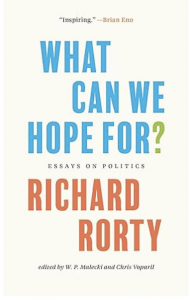My in-pile of books is a bit random at the moment. I just finished a posthumously-published set of essays by Richard Rorty, What Can We Hope For? It’s a strikingly passive title (as indeed was Lenin’s What is to be Done? although less so), and the essays have a notably pessimistic tone. Rorty is known for his prescience about the threats to American democracy posed by grotesque inequality, the crumbling of jobs and the fabric of middle America and authoritarian tendencies. He famously warned of the chance of a strongman dictator 20 years before Trump’s 2016 election. Rorty is known also for his critique of the frivolity of the campus-led American left as well as of the viciousness of the American right. These features are prominent in many of the essays.
However, I enjoyed the earlier section consisting of philosophical essays more than the (then-)current political commentary in the later sections. I haven’t read much by Rorty but am inclined to like his pragmatism: “It does not matter whether we can get consensus on moral principles,” he writes, “As long as we can get it on practices.” And, “The fact that moralities are, among other things, local systems of social control does no more to cast doubt on moral progress than the fact that scientific breakthroughs are financed by people hoping for improved technology casts doubt on progress in the ‘hard’ sciences.” He has some nice comments about the folly of the hardline positivist distinction between the rational and everything else – imagination, emotion – in making sense of the world and particularly political decision-making.
The back of the book claims the essays offer creative solutions for solving the world’s and especially America’s problems. I didn’t spot the solutions, unless ‘creative’ is code for ‘implausible’. Hence, I suppose, the title. Hoping not doing.

